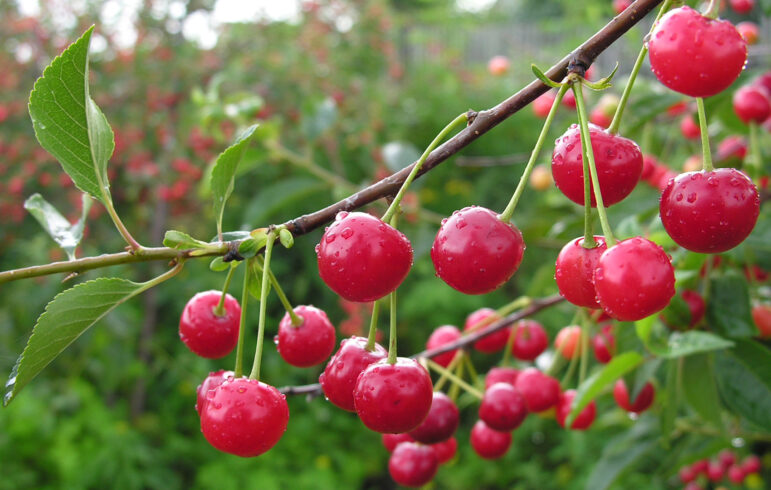
Flickr/Edward Metlinov
One winemaker in northern Michigan is concerned about the recent wild swing in temperature affecting the cherry crop this year.By DAN NETTER
Capital News Service
LANSING – While many Michiganders likely were frustrated by the sudden return to frigid temperatures on April 17, this near 50-degree temperature shift could be a problem for some of this year’s fruit crop, according to one expert.
These wild swings in temperatures are never good, said Jeffrey Andresen, Michigan’s state climatologist.
The swings do happen from time to time, Andresen said, but for the most part it is very unusual and plants require time to adapt.
How often the stark shifts happen is tied to climate change.
The impact on agricultural systems, he said, is certainly more negative than positive. The burst of warmth leaves farmers and growers in a state of vulnerability because it is “moving things along too rapidly.”
The crops most likely to be impacted by the warm temperatures are specialty crops, or crops that are harvested yearly, but take years to mature, said Andresen, who is also a Michigan State University meteorology professor.
Speciality crops typically include fruit, tree nuts and vegetables.
Fruit trees, he said, are susceptible to the changes in temperature because of how trees enter into a hardening process in the fall.
While this process helps them withstand subzero temperatures, that changes quickly when warmer temperatures arrive.
“As soon as it begins to develop in the spring, responding to its environment, then it loses that resistance rapidly,” Andresen said. By the time trees reach April, the damage threshold moves from 30 degrees below zero to 28 degrees above zero.
This makes exiting the dormant state very important for fruit farmers, Andresen said. Once the trees bloom, farmers have to protect them from a spring freeze or risk damaging tree buds.
Andresen said the extreme changes have potential to be bad if the weather in the next few weeks is cold.
Andresen said he is fairly optimistic that the recent temperature swing did not cause major problems for fruit markets because it is still early in the development cycle for crops.
“Many fruit tree species have more buds than they need to set up a crop,” Andresen said. “So you can lose some of the flowers and buds, and still be fine, still be okay and profitable.”
The 80-degree days in April were an anomaly, especially since it was followed by snow, said Lee Lutes, the head winemaker at Black Star Farms in Grand Traverse County.
Lutes said he is not too worried about his vineyard because mature grapevines are deeply rooted plants, making them less susceptible to brief changes in temperatures.
Normally, grapevines are rooted 5 to 6 feet underground by the time they mature, and the oldest roots can reach 12 feet.
The sweet and tart cherry crop could have been damaged, Lutes said. At about 12 inches deep, orchard trees have much more shallow roots, meaning the soil around the roots heats up easily.
Generally the vineyard will be all right, Lutes said, and if anything, he is thankful for the cool off because it likely slowed down the potential growth that may have happened during the warm temperature.
Lutes said he is concerned about the next full moon on May 5, because that is when there is a high barometric pressure.
“With high pressure, we often see clear skies and clear skies are where we see cold nights,” Lutes said. “It’s often that first full moon in May when we are holding our breath a little bit.”
AJ’s Berry Farm in Alpena County had to take their straw covering off their strawberry fields earlier than the co-owner A.J. MacArthur wanted to.
MacArthur is more concerned about the warm temperatures causing the crops to flower in early May because they have had cold weeks in May in the past.
Should a cold snap happen in May, MacArthur said he will irrigate the plants to freeze water during the cold temperatures. This freezing releases heat which MacArthur said helps keep the strawberry plants above freezing temperatures.
The warm temperatures also brought about the end of the maple syrup season because the trees respond quickly to the weather. It’s likely it would have lasted only about a week longer, MacArthur said.
“Trees respond by putting out leaves and that changes the flavor profiles of the syrup,” he said. “Bacteriawise, you get more bacteria in your sap lines and then that spoils the syrup tastes.”